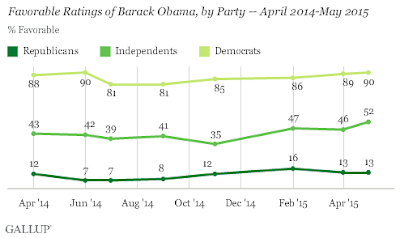It turns out that even if a single payer system would save money on administrative costs, there is a whole lot of money we are collecting to pay for our current system. Finding a way to capture all that and use if for a single payer system would create big winners and big losers. Addressing the problem this creates in making that kind of transfer fair - especially to average Americans on Main Street - is something advocates of single payer haven't addressed.
So instead of single payer we got Obamacare, which has brought the rate of uninsured Americans down to a historical low, all while slowing the rate of health care inflation and extending the life of Medicare.
When President Obama took office, this country was careening towards another Great Depression. Treasury Secretary Tim Geithner has said in retrospect that his goal was to provide a soft landing for the economy. Some economists thought that the best option was to nationalize the financial institutions that were near collapse (and would have triggered a Great Depression if they were allowed to do so). Instead, through an infusion of both public and private money, we bailed them out and initiated "stress tests" to demonstrate the kind of stability that could calm everything down.
It turns out that, while this produced a slow recovery (but faster than any other country), it ended up costing taxpayers less that the alternative of nationalizing the banks. It also had the desired effect of calming things down rather than ramping up the kinds of insecurities that would have come from nationalizing the banks. After criticizing Geithner for this approach, even Paul Krugman has admitted that it worked. In other words, it protected Main Street from another Great Depression and the kind of insecurity and chaos that would have led to a prolonged Great Recession.
That was followed up by the passage of Dodd-Frank that brought us the Consumer Financial Protection Bureau, made the stress tests an annual occurrence, and incentivized the "too big to fail" financial institutions to downsize.
My purpose in going back over all that history is to point out that there is a lesson to be learned about President Obama's approach. The current frame on these issues is that populist Democratic politicians and presidential candidates who support things like single payer and breaking up the banks are to the "left" of the President because they stand for "Main Street" while he has too often protected "Wall Street." I see that as fallacious thinking.
If you think that the chaos that would be created by jumping from our current health care system to single payer would be good for Main Street, then I'm afraid we disagree. Likewise, if you think the chaos that would have been created by nationalizing the banks would have socked it to Wall Street but had no impact on Main Street, then I think you aren't paying enough attention to how our economy works.
Over the years President Obama has often referred to his "North Star" that guides him. Here's how he described it back in 2010.
So, my job is to make sure that we have a North Star out there, what is helping people live out their lives; what is giving them more opportunity.From watching him over the years, I'd suggest that its safe to say that following his North Star means recognizing the fact that the disruption of huge change creates unintended consequences that usually fall disproportionately on Main Street. Instead, he has sought changes that slowly and steadily build on a platform of security and increasing opportunity.
There are those who legitimately disagree with this view of change. Some deny that chaos is the result of big change and other simply think it would be worth it. That's a debate we need to have. But we'll never have that conversation as long as we continue to cling to the fallacious thinking that I've described here. Protecting Main Street from the unintended consequences of chaos while redirecting our ship of state towards our North Star is actually my idea of what pragmatic progressivism should be about. You might see it differently. That would be the basis for an intelligent debate.






















